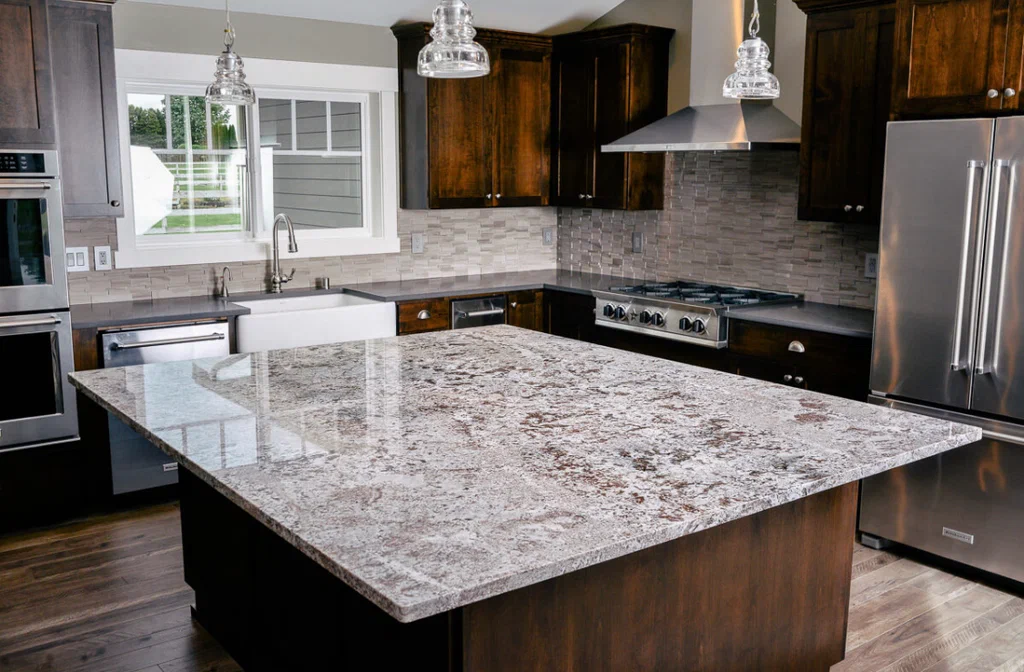Quartz countertops are popular for their durability, beautiful appearance, and ease of maintenance. While quartz is resistant to staining and scratching, it still requires proper cleaning to maintain its pristine look and longevity. In this guide, we will explain the best practices for cleaning quartz countertops and how to keep them looking as good as new.
1. Why Quartz Countertops Need Regular Cleaning
Quartz is a non-porous surface, which makes it resistant to stains from liquids like coffee, wine, or oils. However, like any surface, it can accumulate dust, crumbs, spills, and grease over time. Regular cleaning prevents the buildup of grime and keeps your countertop looking shiny and spotless.
It’s also important to note that while quartz is durable, certain cleaning methods or products can damage the surface. Avoid harsh chemicals or abrasive tools to preserve its shine and integrity.
2. Essential Tools and Supplies
To clean quartz countertops effectively, you don’t need an extensive list of cleaning supplies. Here’s what you’ll need:
- Soft microfiber cloths
- Dish soap or mild dish detergent
- Warm water
- Non-abrasive sponge or cloth
- Glass cleaner (optional)
- Baking soda (for tougher stains)
By using the right materials, you can ensure that your quartz countertops are cleaned gently without causing damage.
3. How to Clean Quartz Countertops: Step-by-Step Guide
Cleaning quartz countertops is simple and can be done with a few easy steps. Here’s how:
Step 1: Wipe Down Daily with Mild Soap and Water
The first step in cleaning your quartz countertops is to wipe them down daily with a microfiber cloth or a soft, non-abrasive sponge. Start by mixing a small amount of dish soap with warm water, and dampen the cloth with the soapy water. Gently wipe the surface, focusing on areas where crumbs or spills may have accumulated.
For routine cleaning, this method will keep your quartz countertops looking fresh and free from debris.
Step 2: Rinse and Dry the Surface
After wiping the countertops with soapy water, rinse the surface by wiping it down with a clean cloth dampened with plain water. This removes any soap residue that could leave streaks or dull the finish. Follow up by drying the surface with a dry microfiber cloth.
Step 3: Remove Tough Stains with Baking Soda Paste
For stubborn stains that don’t come off with regular cleaning, a baking soda paste can help lift the stain without damaging the surface. Mix a tablespoon of baking soda with a few drops of water to create a thick paste.
Apply the paste directly to the stain and let it sit for 10 to 15 minutes. Afterward, gently scrub with a soft sponge and rinse the area thoroughly. For particularly tough stains, you may need to repeat this process once or twice.
Step 4: Use Glass Cleaner for Extra Shine (Optional)
For an extra shine, you can use a non-abrasive glass cleaner. Simply spray the cleaner onto the countertop, wipe it down with a clean cloth, and buff it to a shiny finish. This step is optional but helps to enhance the appearance of your quartz countertops.
Step 5: Avoid Using Harsh Chemicals
While quartz countertops are durable, using harsh chemicals like bleach, ammonia, or strong abrasive cleaners can damage the surface over time. These products can break down the resin that holds the quartz together, leading to discoloration or dullness. Always opt for a mild dish soap solution or a specialized quartz cleaner.
4. What to Avoid When Cleaning Quartz Countertops
To ensure your quartz countertops stay in top condition, avoid the following:
- Abrasive cleaning pads: Steel wool or scrubbing brushes can scratch the surface of quartz, causing irreversible damage. Always use a soft sponge or cloth.
- Harsh chemicals: Strong cleaning agents like bleach, ammonia, and acidic cleaners can degrade the surface of your quartz countertop. Stick to mild dish soap or stone-safe cleaners.
- Hot pots and pans: Quartz countertops are heat resistant but not heat-proof. Always use trivets or heat pads to prevent damage from hot cookware, as extreme temperatures can cause discoloration or cracks.
- Cutting directly on the surface: Although quartz is scratch-resistant, cutting directly on the countertop can leave marks. Always use a cutting board to preserve the countertop’s surface.
5. How to Maintain the Shine and Luster of Quartz Countertops
Regular maintenance is key to keeping quartz countertops looking their best. Here are a few tips to help maintain their shine:
- Clean spills immediately: Although quartz is resistant to stains, it’s still a good idea to clean up spills as soon as they occur, especially if they are acidic (like citrus juice or vinegar).
- Seal your countertops (if necessary): Most quartz countertops don’t require sealing because they are non-porous, but if you have a natural stone quartz countertop with a porous surface, it may need sealing. Always follow the manufacturer’s recommendations.
- Use a cutting board: To prevent scratches, always use a cutting board when preparing food on your quartz countertops.
- Consider a protective mat: If you frequently place hot items on the countertop, use a heat-resistant mat to avoid damage from heat exposure.
6. How to Remove Common Stains from Quartz Countertops
Quartz countertops are resistant to most stains, but certain substances can leave marks if not cleaned promptly. Here’s how to handle some common stains:
Coffee and Tea Stains
- Use warm water and dish soap to clean. If the stain persists, make a paste with baking soda and water, apply it to the stain, and let it sit for 15 minutes before scrubbing gently.
Grease and Oil Stains
- Grease stains can be cleaned using a mixture of dish soap and warm water. For tougher grease spots, use rubbing alcohol or a non-abrasive cleaner.
Wine and Juice Stains
- For wine or juice stains, clean the area immediately using soap and water. If necessary, use baking soda paste for stubborn spots.
Conclusion
Quartz countertops are a beautiful and durable addition to any kitchen or bathroom, and with proper care, they can last for many years. Regular cleaning with mild soap and water is key to maintaining their appearance, while occasional use of baking soda can help with tougher stains. Avoid using harsh chemicals or abrasive tools, and always be mindful of heat and sharp objects. By following these simple steps, you’ll ensure that your quartz countertops remain spotless and shiny for years to come.
FAQs
1. Can I use vinegar to clean my quartz countertops?
No, vinegar is acidic and can damage the surface of quartz countertops. It’s best to avoid using vinegar and opt for a mild dish soap solution instead.
2. How often should I clean my quartz countertops?
Quartz countertops should be cleaned daily to maintain their appearance. For regular cleaning, wiping down with soap and water is sufficient. More thorough cleaning with baking soda or a specialized cleaner can be done as needed.
3. Can I use bleach on quartz countertops?
No, bleach can degrade the resin in the quartz, causing discoloration and damage. Always use a mild dish soap solution or a cleaner specifically designed for quartz surfaces.
4. Are quartz countertops heat-resistant?
Quartz countertops are heat resistant but not heat-proof. Avoid placing hot pots, pans, or other cookware directly on the surface. Always use trivets or heat pads to protect your countertop.
5. Can I cut directly on a quartz countertop?
While quartz is scratch-resistant, cutting directly on the surface can leave marks and damage the finish over time. It’s best to always use a cutting board to protect your countertop.

